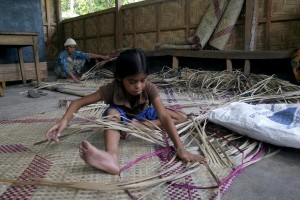DATU SALIBO, Maguindanao (MindaNews/8 Sept) – At eight years old, Sandra Tahir, whose family once evacuated because of clashes between Moro rebels and the military in Barangay Madiya, has already mastered the art of weaving sleeping mats, or what is called locally as “banig.”
 Sandra, now a Grade 2 pupil, started weaving mats about two years ago when they were still at an evacuation center in Datu Odin Sinsuat, said her mother Monawra.
Sandra, now a Grade 2 pupil, started weaving mats about two years ago when they were still at an evacuation center in Datu Odin Sinsuat, said her mother Monawra.
“My mother will initially weave a portion of the mat then she will leave it to me to finish it,” the young Tahir said. She usually finishes a mat within the day.
“Nobody taught her. She’d just watch us whenever I was weaving, even before we evacuated,” Monawra said.
Inside a room known as “Child- Friendly Space,” three former bakwits (as evacuees are called around here), including the younger Tahir, were weaving sleeping mats using pandan leaves. Pandan (Pandanus utilis) is commonly found around the Ligawasan Marsh. Its long leaves are gathered and sun dried before these are split into strips.
Monawra said they earn P65 for each sleeping mat. For the elder weavers, they can usually finish two mats in a day.
“She’s just helping me these days because I’m still pregnant and I cannot work longer, especially now that we are also fasting,” Monawra said, referring to the month of Ramadan.
She added that mat weaving is a common source of income among women in their village. Their husbands usually work as laborers in nearby farms or drive pedicabs, locally known “sikad.”
The weavers acquired the craft from their ancestors, said Monawra. “This has been passed from one generation to another.”
When they were still at the evacuation camp, weavers could hardly sell their products, she recalled. “At least right now, we are slowly recovering. Through weaving these mats, we would be able to rebuild our lives,” she added
The Tahir family is one of at least 480 families from Madiya who fled during the war in 2008 following the aborted signing of the Memorandum of Agreement on Ancestral Domain (MOA-AD).
The evacuees returned to their village only last April, almost two years after the war.
The Central Mindanao Livelihood Assistance and Resource Development Foundation (Cemilardef) is helping the mat weavers. The group buys the mats, then resells them to different outlets in Cotabato City, said Albaya Andamen, project manager.
The buying price, she said, depends on the design and quality of the product. But normally, they buy each sleeping mat at P65 each.
“If the design or color is good, we pay higher, up to P80 each,” she said.
The weavers use dye to produce different color combinations on weaving mats.
A double-sized sleeping mat costs P200 direct from the weavers. In the market, it is at least P270.
Weavers in Madiya can produce at least 100 sleeping mats in a week, said Andamen. About 65 families are into weaving.
Cemilardef has been buying the sleeping mats since about two months ago, she said.
“This is our way of helping the former evacuees to recover from the war. Otherwise, it would be harder for them to sell their products to the commercial market,” said Andamen. (Keith Bacongco / MindaNews)
